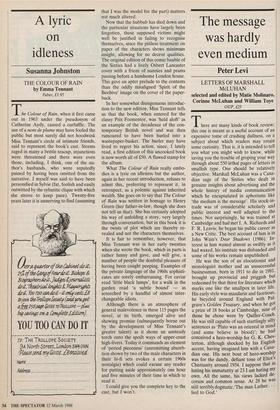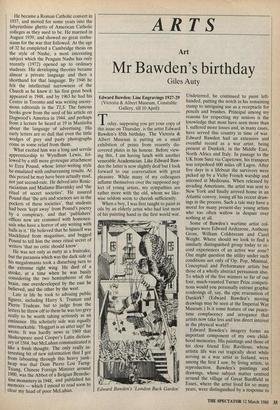The message was hardly even medium
Peter Levi
LETTERS OF MARSHALL McLUHAN selected and edited by Matie Molinaro, Corinne McLuhan and William Toye
OUP, £25
There are many kinds of book review; this one is meant as a useful account of an expensive tome of crashing dullness, on a subject about which readers may retain some curiosity. That is, it is intended to tell you what you might wish to know, while saving you the trouble of groping your way through about 550 lethal pages of letters in smallish type. One should be relatively objective. Marshall McLuhan was a Cana- dian sage of the Sixties who dealt in genuine insights about advertising and the whole history of media communication which he encapsulated in aphorisms like 'the medium is the message'. His stock-in- trade was of considerable scholarly and public interest and well adapted to the times. Not surprisingly, he was trained at Cambridge and had met I. A. Richards and F. R. Leavis; he began his public career as a New Critic. The best account of him is in John Wain's Dear Shadows (1986). In- terest in him waned almost as swiftly as it had waxed, his institute was disbanded and some of his works remain unpublished. He was the son of an elocutionist and monologuist mother and an unsuccessful businessman, born in 1911 to die in 1981, brought up provincial and priggish but redeemed by that thirst for literature which marks one like the smallpox in later life. His early style was mandarin and facetious, he bicycled around England with Pal- grave's Golden Treasury, and when he got a prize of 18 books at Cambridge, nine of those he chose were by Quiller-Couch. He was still capable of such startlingly silly sentences as 'Plato was an oriental in mind (and some believe in blood)'; he had conceived a hero-worship for G. K. Ches- terton, although shocked by his English accent, having imagined him with a Cana- dian one. His next bout of hero-worship was for the dandy, defiant tone of Eliot 's Chistianity around 1934. I suppose that in hating his immaturity at 23 I am hating my own. All the same, his views lacked de- corum and common sense. At 28 he was still terribly dogmatic.`The man Luther. • - lied to God.' He became a Roman Catholic convert in 1937, and moved for some years into the labyrinthine ghetto of American Catholic colleges as they used to be. He married in August 1939, and showed no great enthu- siasm for the war that followed. At the age of 32 he completed a Cambridge thesis on the style of Nashe, a most interesting subject which the Penguin Nashe has only recently (1972) opened up to ordinary students. His developing theories became almost a private language and then a shorthand for that language. By 1946 he felt the intellectual narrowness of the Church as he knew it: his first great book appeared in 1948, and by 1963 he had his Centre in Toronto and was writing anony- mous editorials in the TLS. The famous books grew from the seed of his article on Dagwood's America in 1944, and perhaps from a lecture he heard at 19 in Manitoba about the language of advertising. His early letters are so dull that even the little wodges of grey and pasty photographs come as some relief from them.
What excited him was a long and servile apprenticeship to Wyndham Lewis, fol- lowed by a still more grotesque attachment to Ezra Pound, whose letter-writing style he emulated with embarrassing results. At this period he may have been actually mad, not just second-rate. He delved into Rosic- rucianism and Madame Blavatsky and 'the ritual of secret societies'. He assured Pound that 'the arts and sciences are in the pockets of these societies', that students had been 'kept away' from Pound's poetry by a conspiracy, and that 'publishers' offices now are crammed with homosex- uals who have a horror of any writing with balls in it.' He believed that he himself was blacklisted from magazines, and begged Pound to tell him the inner ritual secret of writers 'that no critic should know'.
He was not only as nutty as a fruitcake, but the paranoia which was the dark side of his megalomania took a disturbing turn to the extreme right wing. He died of a stroke, at a time when he was busily considering the two hemispheres of the brain, one overdeveloped by the east he believed, and the other by the west. Late in life he took to advising public figures, including Harry S. Truman and Pierre Trudeau, but to judge from the letters he threw off to them he was too grey really to be worth taking seriously as an eminence. His scholarly side was equally unremarkable. lloggart is an utter sap!' he wrote. It was hardly news in 1969 that Shakespeare used Cooper's Latin diction- ary of 1584, but McLuhan communicated it like a fresh thought. The only really in- teresting bit of new information that I got from labouring through this heavy junk- heap was that Dom Pierre Lou Tseng- Tsiang, Chinese Foreign Minister around 1900, was the Abbot of a Belgian Benedic- tine monastery in 1948, and published his memoirs — which I intend to read soon to clear my head of poor McLuhan.



















































 Previous page
Previous page